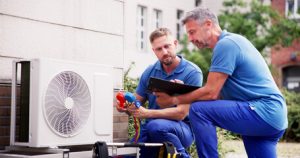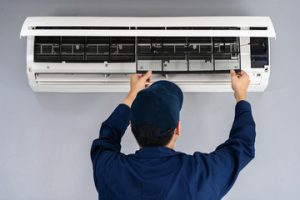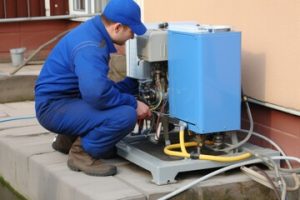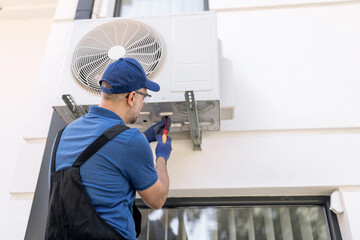Maintaining a comfortable indoor environment throughout the year requires a reliable heating, ventilation, and air conditioning (HVAC) system. Whether in homes or commercial spaces, HVAC Round Rock systems are essential for regulating temperature, controlling humidity, and ensuring clean, breathable air. Proper installation, maintenance, and repair of these systems are critical to achieving consistent comfort, energy efficiency, and long-term reliability. Comprehensive HVAC services provide the expertise and solutions necessary to keep your indoor environment comfortable year-round.
The Importance of Comprehensive HVAC Services

HVAC systems are complex networks of components designed to work together seamlessly. A typical system includes furnaces or boilers for heating, air conditioning units for cooling, ventilation ducts for airflow, thermostats for control, and filters for air quality. Any malfunction or inefficiency in these components can compromise indoor comfort, increase energy bills, and shorten the system’s lifespan.
Comprehensive HVAC services ensure that every aspect of the system is functioning properly. Professionals handle everything from installation and repair to maintenance and upgrades, offering a one-stop solution for reliable indoor climate control. By addressing issues promptly and effectively, these services prevent minor problems from escalating into costly repairs or system replacements.
For homeowners, dependable HVAC services mean consistent temperatures, improved air quality, and lower energy costs. For businesses, they contribute to a productive work environment, customer satisfaction, and compliance with workplace safety standards.
Common HVAC Problems and How Professionals Address Them
HVAC systems can encounter a wide range of issues over time. Identifying and addressing these problems quickly is crucial for maintaining comfort and efficiency. Common HVAC challenges include:
- Inconsistent Heating or Cooling
- When some rooms are too hot or too cold, the problem may stem from blocked vents, failing thermostats, or uneven ductwork. Professionals inspect airflow, calibrate thermostats, and adjust system components to ensure even distribution of heated or cooled air.
- Dirty or Clogged Filters
- Filters trap dust, pollen, and other airborne particles, protecting the system and improving indoor air quality. Over time, filters can become clogged, restricting airflow and reducing efficiency. HVAC technicians clean or replace filters to restore proper airflow and system performance.
- Refrigerant Leaks
- Air conditioning units rely on refrigerant to cool the air effectively. Low refrigerant levels due to leaks can reduce efficiency, strain the compressor, and increase energy consumption. Professionals locate leaks, repair them, and recharge the system to optimal levels.
- Electrical Issues
- Faulty wiring, blown fuses, or malfunctioning capacitors can cause the system to stop functioning or operate intermittently. Skilled technicians safely repair electrical components and ensure reliable operation.
- Strange Noises or Odors
- Grinding, rattling, or buzzing sounds often indicate mechanical or electrical problems, while unpleasant odors can result from mold, mildew, or accumulated debris. HVAC professionals identify the source and perform repairs or cleaning to restore safe, quiet, and clean operation.
- Water Leaks or Frozen Components
- Condensation leaks or ice formation on coils signal issues with drainage, airflow, or system balance. Technicians inspect and correct these problems to prevent damage and maintain efficiency.
By addressing these challenges with timely repairs and maintenance, comprehensive HVAC services ensure that systems perform reliably and efficiently year-round.
Installation and System Upgrades
Professional HVAC services extend beyond repairs and maintenance. Proper installation and system upgrades are critical for long-term performance and energy efficiency.
- Correct Sizing and Installation
- Choosing the right HVAC system size is crucial. An oversized system cycles on and off too frequently, wasting energy and causing wear, while an undersized system struggles to maintain desired temperatures. HVAC professionals assess the property’s size, insulation, and climate conditions to determine the ideal system and ensure precise installation.
- High-Efficiency Units
- Modern HVAC systems offer high-efficiency components that reduce energy consumption while maintaining consistent performance. Upgrading to energy-efficient furnaces, air conditioners, or heat pumps can significantly lower utility bills and support sustainable living practices.
- Zoned Systems
- Zoning allows for independent temperature control in different areas of a property. This approach reduces energy waste, improves comfort, and is especially effective for larger homes or commercial spaces with varying occupancy levels.
- Smart Controls and Thermostats
- Programmable and smart thermostats enable precise temperature management based on schedules, occupancy, or even weather patterns. These systems optimize HVAC performance and reduce energy costs without compromising comfort.
Preventive HVAC Maintenance
Regular maintenance is key to extending the life of HVAC systems and maintaining year-round comfort. Preventive maintenance addresses minor issues before they become major problems, ensures efficient operation, and improves indoor air quality.
Common preventive maintenance tasks include:
- Filter Inspection and Replacement
- Replacing or cleaning filters regularly improves airflow, reduces energy consumption, and prevents the accumulation of dust and allergens.
- Coil Cleaning
- Evaporator and condenser coils collect dirt over time, reducing heat transfer efficiency. Cleaning these coils ensures optimal performance.
- Checking Refrigerant Levels
- Proper refrigerant levels prevent strain on compressors and maintain effective cooling.
- Inspecting Electrical Components
- Checking wiring, capacitors, and connections reduces the risk of electrical failures and improves system safety.
- Ductwork Inspection
- Sealing leaks, insulating ducts, and optimizing airflow improve efficiency and ensure even heating and cooling.
Seasonal maintenance plans offered by HVAC professionals schedule inspections before peak heating or cooling periods, helping property owners avoid emergency repairs and maintain consistent comfort.
Energy Efficiency and Cost Savings
Efficient HVAC systems provide comfort while reducing energy consumption and utility bills. Professional HVAC services enhance efficiency by:
- Fixing leaks in ducts or refrigerant lines
- Cleaning or replacing clogged filters and dirty coils
- Repairing or replacing worn mechanical components
- Calibrating thermostats for accurate temperature control
By optimizing system performance, property owners can enjoy lower energy costs, reduced environmental impact, and reliable indoor comfort throughout the year.
Indoor Air Quality
HVAC systems play a critical role in indoor air quality. Proper ventilation, filtration, and humidity control help reduce allergens, dust, mold, and pollutants. Comprehensive HVAC services include:
- Filter Upgrades
- High-quality filters capture finer particles and improve air quality.
- Humidifiers and Dehumidifiers
- Controlling humidity levels prevents mold growth, reduces allergens, and enhances comfort.
- Air Purification Systems
- Advanced purification technologies remove contaminants and improve overall air quality.
By integrating air quality solutions into HVAC maintenance and repair, professionals create healthier, more comfortable indoor environments.
Residential and Commercial Benefits
Residential Homes:
Comprehensive HVAC services provide consistent indoor temperatures, improved air quality, and energy savings. Homeowners benefit from longer system lifespan, fewer breakdowns, and enhanced comfort during both summer and winter months.
Commercial Spaces:
Businesses require reliable HVAC systems to maintain productivity, protect equipment, and ensure customer satisfaction. Professional services minimize downtime, provide preventive maintenance, and deliver efficient climate control for large or complex spaces.
Signs You Need Professional HVAC Services
Property owners should watch for indicators that HVAC maintenance or repairs are needed:
- Inconsistent indoor temperatures
- Strange noises or odors from the system
- Reduced airflow from vents
- Water leaks or ice buildup on components
- Frequent cycling or short-cycling of the system
- Higher-than-usual energy bills
Recognizing these signs early and scheduling professional service ensures prompt repairs and prevents costly system failures.
Choosing Reliable HVAC Services
When selecting an HVAC service provider, consider:
- Experience and Expertise
- Skilled technicians with experience across multiple HVAC systems ensure accurate repairs and reliable service.
- Comprehensive Offerings
- Providers offering installation, repair, maintenance, and upgrades deliver a one-stop solution for year-round comfort.
- Response Time
- Fast and efficient service is critical, especially during extreme weather conditions.
- Quality Parts and Components
- High-quality parts improve system reliability and longevity.
- Preventive Maintenance Plans
- Scheduled inspections and maintenance help avoid emergency repairs and improve energy efficiency.
Selecting a reliable HVAC service ensures consistent, safe, and efficient indoor comfort for homes and businesses alike.
A comfortable indoor environment is essential for well-being, productivity, and overall quality of life. Comprehensive HVAC services provide the expertise, repairs, maintenance, and upgrades needed to ensure year-round comfort, energy efficiency, and reliable system performance.
Professional installation, preventive maintenance, and prompt repair address common HVAC challenges, restore efficiency, and prevent costly system failures. Integrating high-efficiency components, smart controls, and air quality solutions further enhances indoor comfort and reduces energy costs.
Whether for residential homes or commercial spaces, comprehensive HVAC services are a critical investment in maintaining consistent, healthy, and comfortable indoor environments. By relying on skilled professionals, property owners can enjoy reliable heating, cooling, and ventilation year-round, ensuring both comfort and energy efficiency for the long term.


